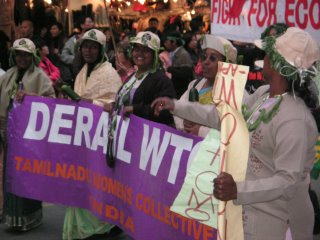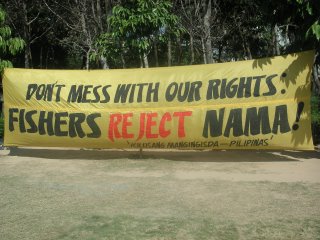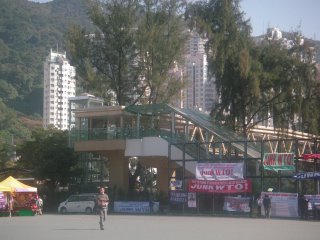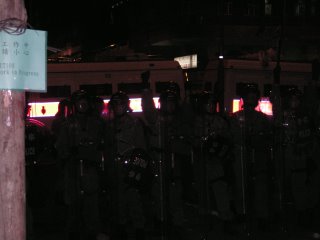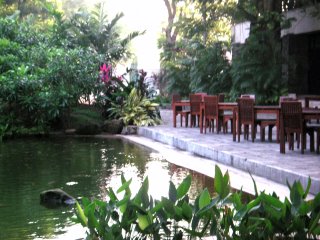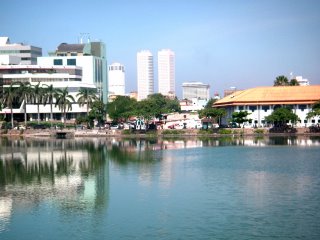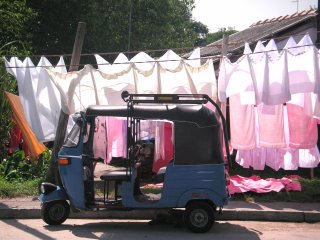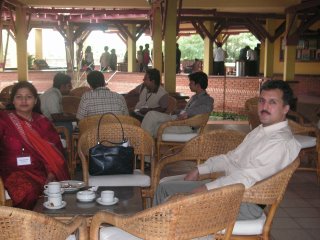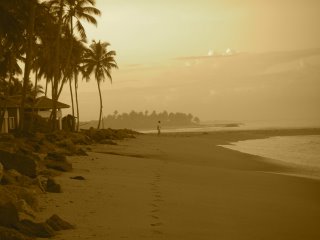Fri, 2 December, 2005
Friday afternoon I finally met the people with whom I will be working, only, because it was Friday the office was slow and many people were on missions or giving training sessions. Moreover, the Trade and Investment cluster, where I will be researching, attended a colleague’s Buddhist wedding about 10km south of Colombo, in Mount Lavinia. Apparently, this area has an enormous resort and according to the astrology, Friday was a good, harmonious day to get married. There were three other weddings that day and about two hours worth of traffic, hence, it took awhile for Yumiko and Riza to return to Colombo and meet me. Eventually, they collected me in a taxi van, which then wound around the bigger, human-made Beira Lake in central Colombo.
It is a short, 10-minute drive to the offices from Cinnamon Grand Hotel, and while there are few green public spaces, in terms of parks, the city is enveloped by lush leafiness. People spill over everywhere! Traffic is intense during the week and people carrying buckets, laundry, market goods and just about anything you can imagine, on their heads, weave in and out of the congestion. Surrounding Beira Lake is a reputable section of the city, called Slave Island, with a posh shopping and dining street, I believe Duplication Rd. Slave Island was carved out by Dutch colonists in 1600s and irrigated with the two Beira Lakes, in order to house their Tamil, Sinhalese, etc slaves. I believe crocodiles still reside in the lake, which had been used to prevent slaves from escaping. Right, so this now lush district is near the office, off Vauxhall Road. While the surrounding area is quite lovely, Colombo has significant criminal activity and I am advised to go to work via a taxi or tuk-tuk, or three-wheel, covered motorized vehicle. Taxis are cheap, about $1-3 for the journey. Riding a bicycle would be suicide, unfortunately. Not to mention, the often 40-degree weather makes it ridiculously hot to ride. However, in other cities around Sri Lanka bicycles are the prominent way to get around and if I get a moment to travel to Galle, on the southern coast, or Kandy, in the centre, I will look into renting a bicycle. Thus, for those of you with the weather conditions and smoothly paved roads, get on a bike!
It is unfortunate to hear the advice of colleagues that (Western) women should not be keen on exploring on their own (yet, it is common to get acquaintances to chaperone you). Of course, there are the typical tourist areas, like the shopping on Galle Face Road, the bizarre Pettah Market, the museums and government offices around Cinnamon Gardens district and the casinos where it is patrolled and safe. Perhaps I’ll visit the museums and Pettah Market, but I’m not keen on the tourist attributes. It won’t make a difference what I do, I will always be a tourist here, one with money to spend (the average monthly income for most people is $50 USD – I’ll make 40 times that). But I can’t help but feel sheltered and isolated. While commuting to the offices and to Negombo I witness the liveliness, brightness, hub of activity all around me, yet I am cornered in a pristine ivory Cinnamon Grand Hotel tower, sort-to-speak. It’s bloody immaculate in here –too much for my cluttered, chaotic brain-- so should I only be content to catch a whiff of activity on quick jaunts? Pea green canals, turquoise Indian Ocean mirror the azul sky, scarlet and orange soil -(I wonder what is the soil consistency and stratigraphy)- sidewalks shoulder the main roads when leaving the city, dusty red and green tuk-tuks zip all around me, saris of every color, and a million eyes fixate on me. Of course, residing in an ivory tower, researching the Cambodian and Laos garment and textile working conditions *QUOI?!*, does not help my paranoia and anxiety, which I usually have while in North America.
Anywho, meeting my colleagues restabilises me in a sense. This Regional Centre originally stemmed from a Asia-Pacific Bureau, in New York, and divided itself in Bangkok, then Kathmandu. With the present conflict in Nepal’s capital, this centre moved to Colombo. The two regional centres concentrate on different projects, with gender mainstreaming built into both. This one in Colombo focuses on poverty, MDGs, pro-poor macro-economic policies, HIV/AIDS, gender, trade and globalisation, and crisis prevention. The two main initiatives (in response to collapse of WTO Ministerial in Cancun) deal with poverty reduction and linking trade with human development. While it is difficult to gauge how effective are the Trade and Investment cluster’s strategies, it generally sends its core programme officers on missions to help train government officials and other development personnel to make more effective, human development-centric policies. It produces different tracking and evaluation reports, organizes training workshops (such as on gender and trade), and hires a network of consultants to work in the region.
I hope to meet my boss ‘Butch’ and others next week, or after WTO 6th Ministerial. I’ll have to be wary of a fellow American research associate, Mac, who seems starved to talk to an American woman. Quite keen to “show me around”, but I can’t be bothered. From the few hours I spent at the offices on Friday afternoon, I learned about some of my upcoming projects, so I will be very busy. Yumiko and Mr. R.A. (formerly a leader of a South Asian farmers’ rights organization) are finishing a tracking report, a sort of one-year-since-the-end-of-the-Multi-Fibre-Agreement (MFA)-in-the-Asian-textile/garment-industry report. (Apparently, it’s not as bad as what many development folks predicted, I mean the shut down of 50 or so factories in Nepal, only resulted in an increased shift to prostitution for Nepalese women! Some women have migrated to other countries to send back remittances, but they also risk trafficking. Still it’s not as bad as in Bangladesh?! Not sure how one is supposed to compare the negative repercussions…I mean, the whole design of the garment industry is pants…[er, crap]!). Right now, I am trying to find out more information about a couple of our case studies’ working conditions. We only have time and interviewing resources to investigate Bangladesh, Cambodia, Pakistan, Sri Lanka, and (maybe Lao PDR and Nepal). Cambodia is lacking major information about working conditions, hours, wages, unionizing. Not surprisingly, the Ministry of Labor and private sector development in Cambodia tend to gloss over such pertinent information, so I am trying to rely on International Labor Organization (ILO), OXFAM , UNIFEM and previous UNDP Human Development reports (…I can’t use Workers’ Rights Consortium monitoring reports of Nike and Gap factories in Cambodia?). My briefing will only be a few pages, but is due Monday. I am trying to work on it in between attending sessions of the Economic Journalists conference. But it is difficult due to no internet at this resort…
…I will try to post my findings in some way…or provide links to final versions that go to press.












